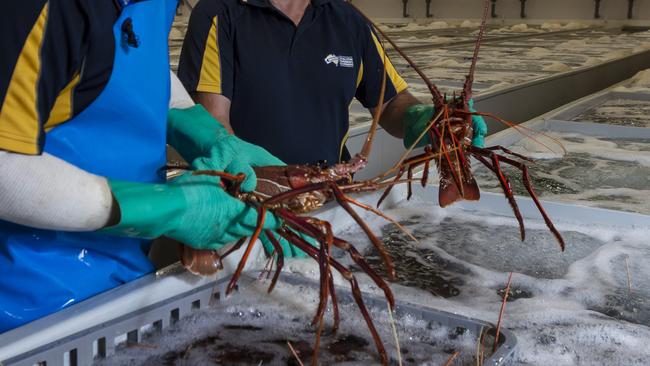Chinese to pay more for Australian lobster amid export halt
An abrupt four-day hold up at Shanghai airport has seen $100,000 worth of live Australian rock lobster dead or spoiled, causing deep unease in the industry.

Chinese consumers will soon pay more for premium lobster as political uncertainty hits their biggest supplier Australia.
An abrupt four-day hold up at Shanghai airport has seen $100,000 worth of live Australian rock lobster dead or spoiled, causing deep unease in the industry.
The inability of Trade Minister Simon Birmingham – who remains in the role after being sworn in as finance minister – or any other member of the Morrison government to speak to their Chinese counterparts has heightened concerns in the more than $700m-a-year export industry.
Labor’s agriculture and resources spokesman Joel Fitzgibbon and trade minister Madeleine King said it demonstrated the need for Prime Minister Scott Morrison to appoint a trade minister who could “devote the requisite time and energy to fix our trade problems with China”.
“Australian exporters could rightly ask: what is the holdup with appointing a new Trade Minister?” they said in a statement.
Retaliatory trade action on Australian barley, beef and wine has increased fears across industries that are highly leveraged to China’s huge market.
Sources in the lobster industry – which exports more than 90 per cent of its product to China – said it remained unclear if the Shanghai hold up was politically motivated or the result of new regulations or overzealous customs officials.
Southern Rocklobster Limited executive officer Tom Cosentino said the halt would continue until the Chinese side explained the situation.
“A decision has been made by the majority of exporters to stop sending shipments to China,” said Mr Cosentino, noting the industry was engaging with Chinese authorities over a new customs process that had not been properly explained.
In a subsequent statement issued late on Monday, Mr Cosentino said there had been “positive signs” in talks with Chinese authorities.
Australia dominates the premium lobster trade in China, supplying 55 per cent in 2019, worth more than $700m.
New Zealand is the second largest supplier with a 21 per cent share of its premium lobster sales, according to the United Nations’ Comtrade database.
Dong En, who runs a seafood business in Beijing, said Australian lobster was the “unchallengeable number one” for the high end restaurants and VIP lounges she sells too.
“For us, Australian lobsters are the best we can get from the market and the best we can provide to our customers,” she told The Australian.
Canada and the United States supply the Chinese market with cheaper “Homarus” lobsters, which sell for far less than Australia and New Zealand’s large cold-water lobsters.
Removing Australia’s product – which last year made up 36.5 per cent of China’s entire lobster imports – would see the prices spike during the end-of-year wedding period and in the lead up to the Lunar New Year holiday in January.
“The live lobster market is a case of mutual dependence,” said James Laurenceson, director of the Australia-China Relations Institute.
“This means trade actions that hurt Australian producers will inevitably hurt Chinese consumers too,” professor Laurenceson told The Australian.
While three shipments of Australian lobsters were held up last Thursday in Shanghai, another six shipments entered China through the southern cities of Shenzhen and Guangzhou without any regulatory hurdles.
Trade Minister Simon Birmingham said it was important not to “jump at shadows” over the lobster delay.
But the South Australian senator said the current tense environment was having an impact on the decisions of Australian companies.
“The risk profile of trading with China has clearly increased this year as a result of a number of concerning trade and regulatory decisions,” senator Birmingham told The Australian.
The costly Shanghai hold up happened days before the city hosts the China International Import Expo (CIIE), its marquee trade event.
In the lead up to the event, Chinese state media has reported positively on the more 200 Australian companies scheduled to appear at the trade fair.
Even the often bellicose tabloid the Global Times was upbeat in a report a fortnight ago, which also criticised “some Western media outlets” for “hyping a ‘shadow trade war’ by China against Australia in retaliation for the latter’s political hostility”.
“Despite the fact that relations between China and Australia seem to be in a downward spiral, perhaps it’s time to feel more optimistic about the two countries’ economic and trade ties,” the Global Times reported.








To join the conversation, please log in. Don't have an account? Register
Join the conversation, you are commenting as Logout